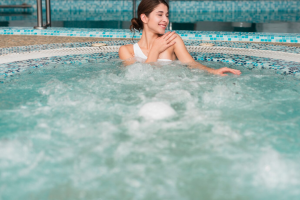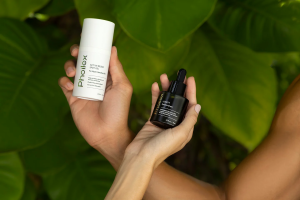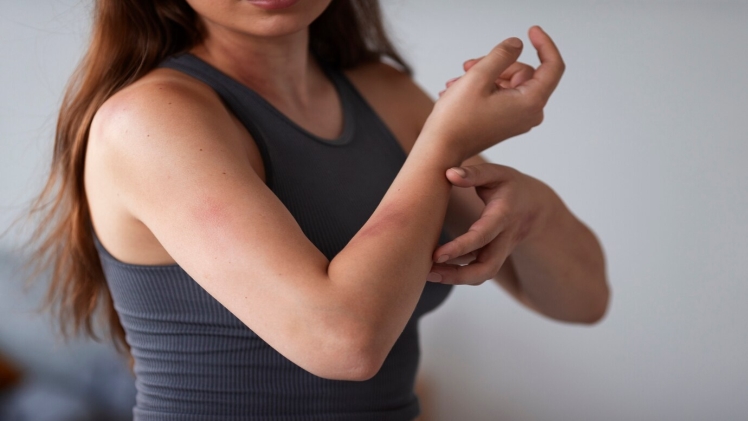Eczema is a type of dermatitis that causes rashes, redness, dry patches, and inflammation on your skin. Individuals with eczema also believe hot water might irritate their skin. Instead, they turn on cold water to naturally heal the skin. If so, does cold water reduce inflammation of eczema?
Today, our blog explains the science behind cold water and offers advice on trying cold showers for eczema. Let’s keep reading to find out more!
Can Cold Water Reduce Inflammation of Eczema?
The short answer might be yes. “There are patients with eczema who report that their skin improves significantly with cold water.”, the National Eczema Association (NEA) says.
To clarify more, let’s take a look at some health benefits below.
1. Relieve Pain And Calm Skin
Cold water might help calm the nerves and comfort eczema. This leads to the medical phenomenon of “analgesics”—meaning that your body relieves damage. Still, little scientific research suggests that the connection between cold water and eczema is entirely adequate, differing from person to person.
2. Prevent Itching Patches
It has been proven that cold water is most effective in cooling the skin within the first 30 minutes, so there is no extra benefit. Despite that, cold water’s soothing effect and immediate relief to the skin is apparent. Cold water can also help hydrate your skin and prevent dryness, potentially leading to itching.
3. Enhance Immune System
According to UCLA Health, cold water can stimulate blood cells to help you fight infection (leukocytes) and protect your body from circulating viruses. This also bolsters your immunity and increases your ability to deal with illness. It’s also when the answer to “Does cold water reduce inflammation of eczema?” is much more apparent.
The Science Behind Cold Showers for Eczema
Taking cold showers for eczema is a common practice of cryotherapy, which involves exposing your skin to cold to relieve skin damage. Some conditions you should treat with cryotherapy include actinic keratosis, liver spots, skin tags, eczema, and warts.
The ideal time cycle for each cryotherapy should last between 2 and 4 minutes and less than 30 minutes. The temperature is often -200°F (-129°C) or lower. When the session is over, you need to get dressed and warm up to maintain a temperature balance on your skin.

Some people support whole-body cooling to treat eczema. They believe this practice can help constrict blood vessels and improve internal inflammation. However, “the US Food and Drug Administration has not cleared or approved any whole-body cryotherapy devices,” found in the 2017 report.
Cryotherapy is indeed not a good eczema treatment for people with a history related to cold allergy, Raynaud disease, cryoglobulinemia, and multiple myeloma. Notably, “Children under the age of 12 are not allowed to use the full body cryo chamber”, the NEA says.
Possible Side Effects of Cold Water on Eczema
Although you can have cold water reduce inflammation of eczema, some problems sometimes occur. It’s not easy to control the temperature when starting cold therapies. You might put your skin under icy conditions, causing blisters and dryness. More seriously, you will stress out due to scarring and skin discoloration.
On the other hand, cryotherapy-related practices might cause different side effects, including skin rashes, frostbite, frozen limbs, suffocation, and sudden memory loss. Therefore, before starting any cryo treatments, it is best to consult your doctor for proper decisions.
To help you prevent negative impacts from cold therapies, Phoilex releases herbal-origin products with different anti-inflammatory properties, including:
- Liverty Dynamic Drops offers vitamins and antioxidants, herbs for the skin barrier, gentle stress relief, fast absorption, and nourishment for external skin.
- Active Releaf Spot Gel is designed as a steroid-free alternative that helps soothe irritation, increase moisturization, and eliminate rough skin texture.
- Dynamic Releaf Duo is a perfect combination of Liverty Dynamic Drops and Active Releaf Spot Gel, which work together to heal eczema and promote healthy skin.

All of Phoilex’s products are tested by dermatologists for the level of safety and effectiveness. When you use these options, you can have gentle eczema control and minimize the allergies to steroids—one of the most common eczema medications today.
Choose Phoilex to Improve Skin Health
Our blog has just helped you answer the question, “Does cold water reduce inflammation of eczema?” Although cold-water therapies have some benefits for eczema, they sometimes come with potential health risks, especially in whole-body cooling practices. Thus, seeking the support of medical professionals is essential to ensure effective skin improvements.
Visit Phoilex’s website to discover our products and learn how Pholiex works well on your skin.
FAQs
Besides cold water, you can consider other cold therapies to control your eczema inflammation. Here are frequently asked questions that you should consider before starting any treatment.
1. Does Ice Reduce Inflammation Eczema?
Yes. Ice (cold compresses) might provide mild relief from itching and inflammation on eczema. Its low temperature temporarily offers a numbing effect to reduce related swelling. However, it’s not a long-term treatment to control your eczema.
2. Does Cold Water Reduce Skin Inflammation?
Yes. According to UCLA Health, “Cold water helps to flush out inflammation — a cause of delayed-onset muscle soreness, which can occur a couple of days after exercise.” Indeed, it can decrease skin inflammation thanks to its ability to constrict blood vessels and increase circulation. Also, cold water can encourage collagen production to enhance skin elasticity.
In case you take cold showers and baths daily, you might invigorate the skin and soothe blemishes. In other words, this method offers a refresher for dermatological wellness.
3. What Cools Down Eczema?
You can cool your eczema symptoms with one of the following solutions:
●Use a cool compress or water to itchy skin;
●Have oatmeal bathing;
●Try anti-inflammatory properties skin products (steroid or non-steroid);
●Keep your skin moisturized.
Whatever treatment you intend to apply to your skin, it’s recommended that you consult healthcare professionals to have the best performance.
References:
●Nelson, S. (2021, December 2). Could Cryotherapy Help Your Eczema? National Eczema Association. https://nationaleczema.org/blog/blog-cryotherapy-and-eczema/
●Hame, S. (2023, January 25). 6 cold shower benefits to consider. Www.uclahealth.org. https://www.uclahealth.org/news/article/6-cold-shower-benefits-consider
●MAUDE Adverse Event Report: WHOLE BODY CRYOTHERAPY; BATH, HYDRO-MASSAGE. (2017). Fda.gov. https://www.accessdata.fda.gov/scripts/cdrh/cfdocs/cfmaude/detail.cfm?mdrfoi__id=7251080&pc=ILJ

